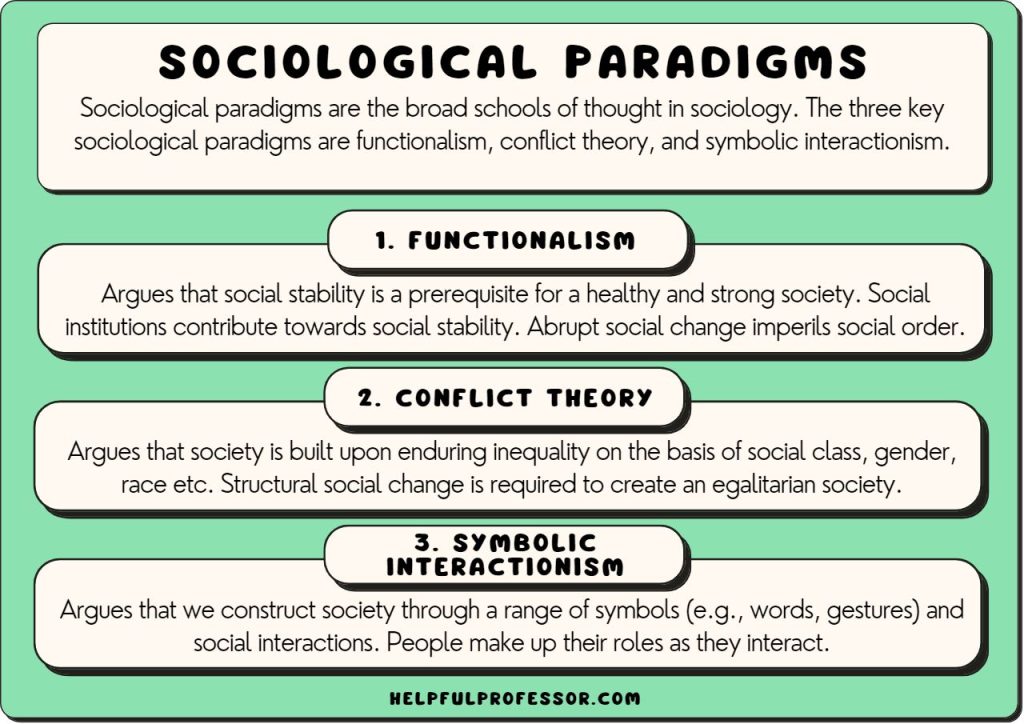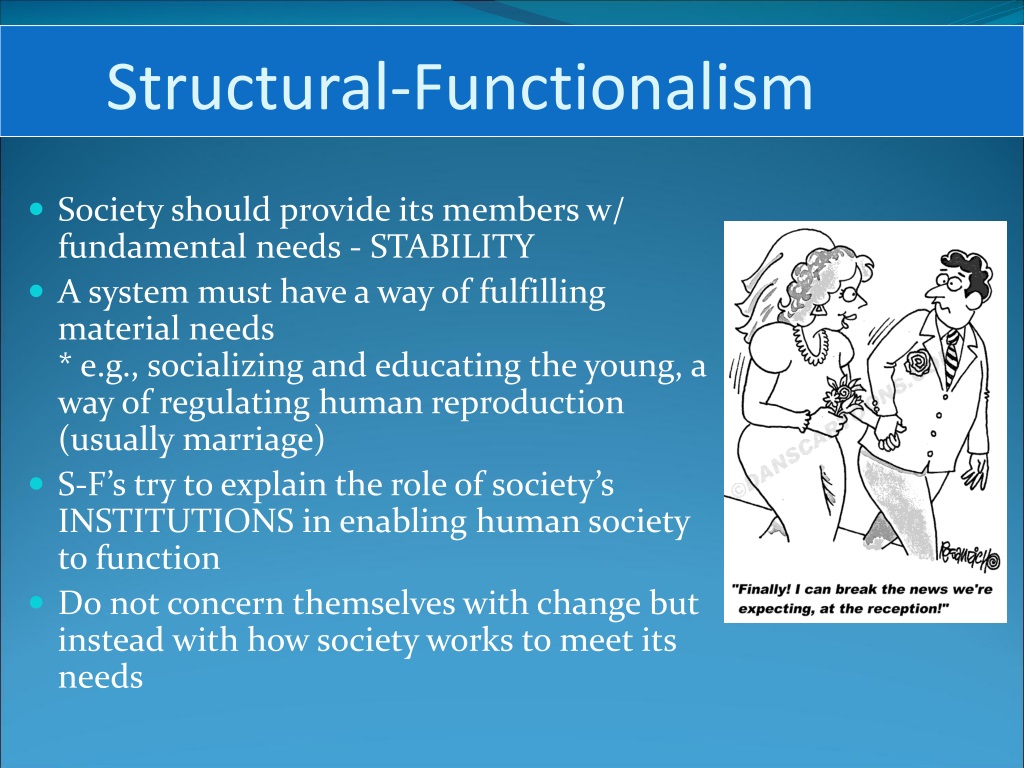Remember that awkward first day of high school? You felt lost, unsure of where to go, and who to talk to. But with time, you found your place. You joined clubs, made friends, and even found yourself gravitating towards certain groups. This seemingly simple experience illustrates a profound social concept – the idea that societies maintain order through a network of interconnected parts, each contributing to its overall stability. This is the foundation of functionalist theory, a sociological lens that views society as a complex machine, with each social institution playing a vital role in keeping it running smoothly.

Image: ar.inspiredpencil.com
Functionalism isn’t just about explaining how societies work, it also helps us understand why they change. As our world evolves, so do the functions of these institutions. New challenges emerge, requiring adjustments and adaptations. This dynamic interplay between social structures and societal needs is what functionalism seeks to uncover.
What is Functionalist Theory?
Functionalist theory, also known as structural functionalism, views society as a complex system composed of interconnected parts, each serving a specific function to maintain social order and stability. It emphasizes the idea that these parts work together in a harmonious way, like the organs in a human body. This perspective originated in the late 19th century with the works of Emile Durkheim, who argued that social phenomena, like crime and deviance, serve a purpose in society.
Functionalism posits that social institutions like family, education, religion, and the economy contribute to the overall well-being and stability of society. Each institution fulfills essential functions that are necessary for the survival of the whole. For instance, the family unit provides socialization, emotional support, and economic stability, contributing to the reproduction of society. Education equips individuals with knowledge and skills, preparing them for their roles in the workforce, and fostering social cohesion. Religion offers moral guidance and a sense of community, reinforcing social norms and values. The economy generates goods and services vital for sustenance and progress.
Key Concepts in Functionalist Theory:
Functionalist theory rests on several key concepts that provide a framework for understanding how society works:
- Social Structure: This refers to the patterned arrangements of social institutions, groups, and individuals in society. It emphasizes how social positions, roles, and relationships are structured and influence social interactions.
- Social Functions: Every institution, group, and role in society serves a specific function that contributes to the overall stability and well-being of the whole. These functions can be either manifest (intended and recognized) or latent (unintended and unrecognized).
- Social Equilibrium: Functionalism emphasizes the importance of social equilibrium, where all parts of society operate harmoniously to maintain stability and order. This is achieved through a balance of social forces and processes that ensure each institution fulfills its intended functions.
- Social Change: While functionalism emphasizes stability, it does acknowledge that change is inevitable. However, it views change as a gradual and adaptive process where new institutions emerge or existing ones adapt to meet new needs or challenges, maintaining a new equilibrium.
Functionalist Theory Examples in Action
To illustrate how functionalist theory applies in real-world situations, let’s examine some real-life examples:

Image: www.slideserve.com
1. The Role of Education:
From a functionalist perspective, education plays a critical role in maintaining social order and stability. It fulfills several essential functions:
- Socialization: Schools teach students about societal norms, values, and expectations, preparing them for adult roles and social interactions.
- Skill Development: Education provides individuals with knowledge, critical thinking skills, and technical abilities, equipping them for the workforce and contributing to economic productivity.
- Social Mobility: Education offers opportunities for upward social mobility, enabling individuals from different socioeconomic backgrounds to advance in society based on their skills and achievements.
- Cultural Transmission: Schools act as vessels for transmitting cultural knowledge and values from one generation to the next, reinforcing social cohesion and continuity.
2. The Family Unit:
The family unit is another cornerstone of society, according to functionalist theory. It fulfills a multitude of essential functions:
- Reproduction and Socialization: Families are responsible for raising children, providing them with basic necessities, and socializing them into the norms and values of society.
- Emotional Support: Families offer a network of emotional support and connection, providing a sense of belonging and security for individuals.
- Economic Function: Families contribute to the economy by providing labor, meeting household needs, and contributing to consumer spending.
- Social Status and Identity: Families provide individuals with a sense of social status and identity, shaping their self-perception and how they are viewed by others.
3. The Function of Religion:
Religion, from a functionalist perspective, fulfills crucial roles in preserving social order and stability:
- Moral Guidance: Religious institutions provide individuals with a framework for understanding right and wrong, encouraging adherence to social norms and values.
- Social Control: Religious beliefs and practices can act as a form of social control, deterring individuals from engaging in deviant behavior.
- Community Building: Religious institutions provide a sense of community, fostering social cohesion and solidarity among members.
- Meaning and Purpose: Religion offers individuals a sense of meaning and purpose in life, helping them cope with life’s challenges and providing a framework for understanding their place in the world.
Functionalism: A Vital Lens for Understanding Society
Functionalist theory provides a powerful lens for understanding how different parts of society work together to maintain order and stability. While it has been criticized for its emphasis on equilibrium and its potential to overlook inequalities and social conflicts, functionalism offers a valuable framework for appreciating the interconnectedness of social structures, institutions, and individual roles. By understanding how different social elements contribute to the overall functioning of society, we can gain insights into social change, social problems, and solutions for fostering a more just and equitable society.
Expert Tips for Applying Functionalist Theory
Here are some expert tips for applying functionalist theory in your own life and understanding social phenomena:
- Look for Interconnections: When examining any social issue, consider how different institutions and social structures might be contributing to or influencing it. For example, if you’re interested in poverty, examine how factors like education, family structure, and the economy might play a role.
- Identify Functions: When observing social phenomena, try to identify both the manifest and latent functions of these activities. For instance, consider the manifest function of a social media website like Facebook as connecting people, but also explore its latent functions in terms of social influence, information dissemination, and marketing.
- Analyze Social Change: Observe how new social structures emerge or old ones adapt to meet new needs or challenges. For instance, note how the rise of online learning has impacted the role of traditional educational institutions.
By applying these tips, you can gain a deeper understanding of the intricate workings of society, the interplay of its various parts, and how social change occurs. This knowledge can empower you to make informed judgments about social issues and actively participate in promoting a more just and equitable world.
FAQ: Functionalist Theory
Q: What are the limitations of functionalist theory?
A: Functionalist theory has been criticized for emphasizing stability and ignoring inequalities, social conflicts, and power dynamics. It can also be seen as overly deterministic, suggesting that social structures dictate individual behavior.
Q: How does functionalist theory relate to other sociological perspectives?
A: Functionalism is often contrasted with other sociological perspectives like conflict theory, which emphasizes power struggles and inequality, and symbolic interactionism, which focuses on the meanings individuals attach to social interactions. These theories offer different perspectives on understanding the workings of society.
Q: Can functionalist theory be applied to understand global issues?
A: Yes, functionalist theory can be used to analyze global issues like migration, economic globalization, and environmental concerns. It can help understand how different parts of the global system interact and contribute to these challenges.
Functionalist Theory Examples
Conclusion:
Functionalist theory offers a powerful framework for understanding the intricate workings of society. By recognizing how social institutions, structures, and individual roles contribute to maintaining order and stability, we gain valuable insights into social change, social problems, and solutions for building a more just and equitable world.
Are you interested in exploring functionalist theory further? Share your thoughts and questions in the comments below!






